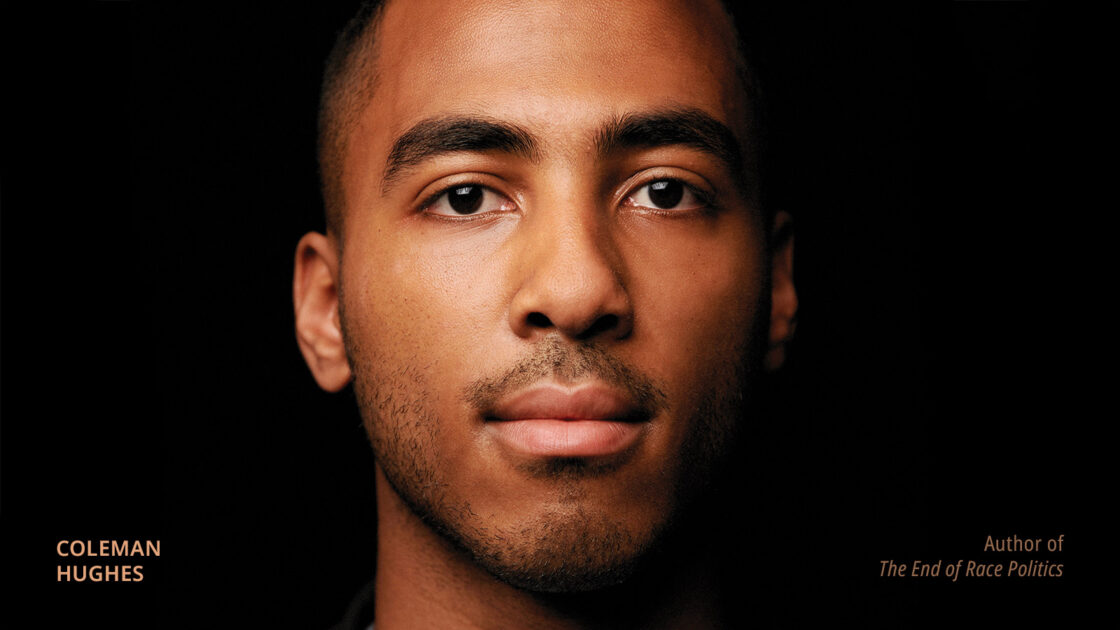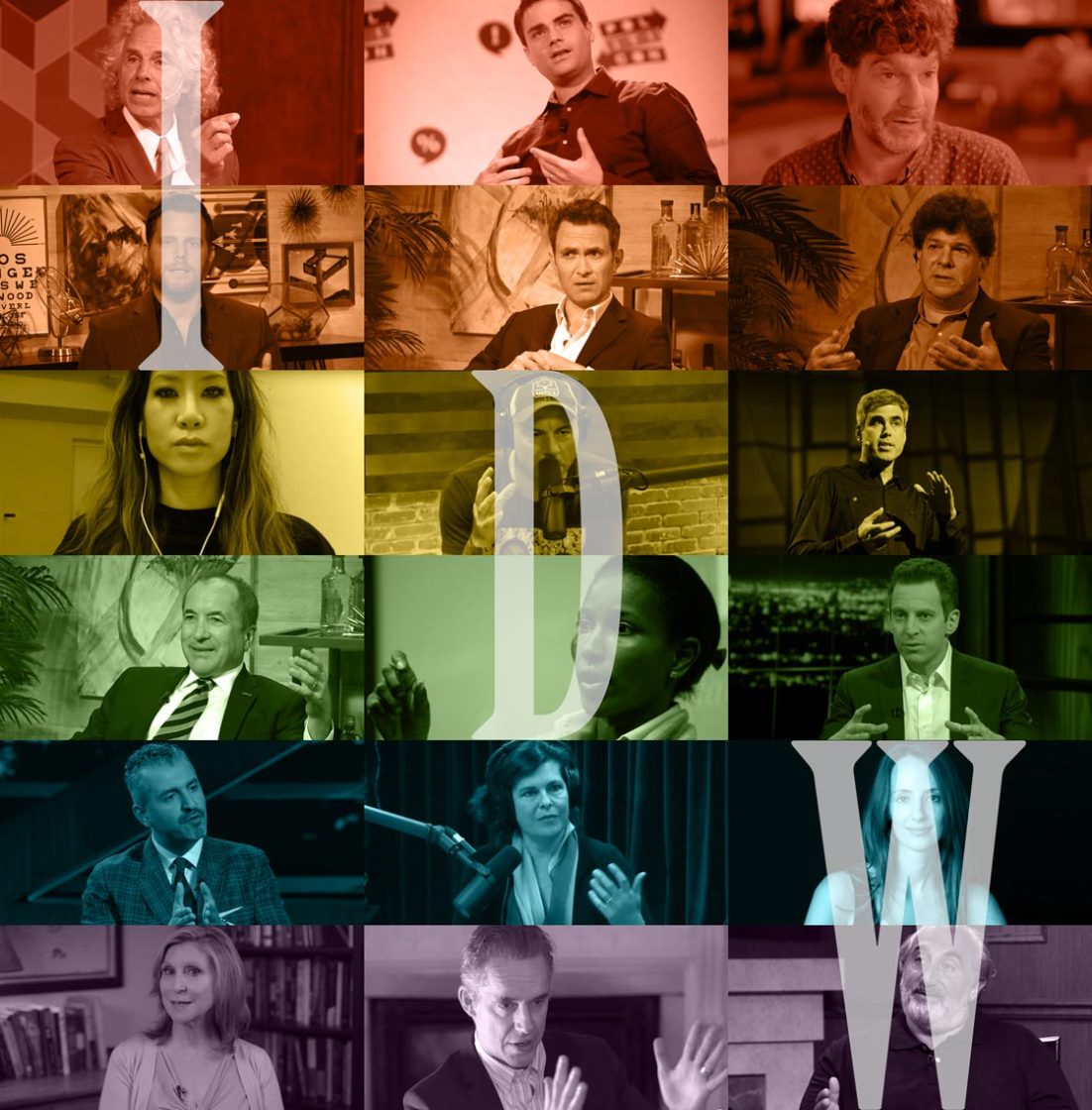Ever since Bari Weiss introduced the world to the “Intellectual Dark Web” much has been written on what the members of the IDW believe. Pundits, journalists, and scholars have confidently espoused their “hot take” of the IDW without the slightest bit of systematic data collection to back up their claims. This empirical study of members of the IDW offers a preliminary summary of their beliefs on a wide range of issues.
In the May 8, 2018 issue of The New York Times the editor and writer Bari Weiss introduced the world to the “Renegades of the Intellectual Dark Web,” which she described as “an alliance of heretics” who are “making an end run around the mainstream conversation.”1 These heretics, she noted, are “iconoclastic thinkers, academic renegades and media personalities” who were “purged from institutions that have become increasingly hostile to unorthodox thought.” In response, their sweep around what Weiss described as “legacy media” included podcasting, blogs, social media, YouTube channels, and public speaking.
Included in this initial cohort were the mathematician Eric Weinstein (who coined the IDW label), the podcaster Joe Rogan, the neuroscientist Sam Harris, the talk show host Dave Rubin, the evolutionary biologists Bret Weinstein and Heather Heying, the psychologist Jordan Peterson, the conservative commentators and authors Ben Shapiro and Douglas Murray, the anti-extremist activist Maajid Nawaz, the feminist activists and authors Ayaan Hirsi Ali and Christina Hoff Sommers, the magazine publisher Claire Lehmann, the neuroscientist and sex researcher Debra Soh, and I (MS). As the conversation continued past Weiss’ New York Times feature, other intellectuals were added to the assemblage, including Steven Pinker, Heather Mac Donald, Niall Ferguson, Gad Saad, James Damore, Jonathan Haidt, Greg Lukianoff, Glenn Loury, John McWhorter, Peter Boghossian, James Lindsay, Helen Pluckrose, Gregg Hurwitz, Geoffrey Miller, Diane Fleischman, Coleman Hughes, Andy Ngo, Jonathan Kay, and Toby Young. A website sprang up featuring most of these thinkers, with photographs, short bios, and links to relevant writings and videos.2
Whoever is included, however, Weiss asked, rhetorically, “Should we be listening?” Her answer in the affirmative led to a flurry of articles, essays, and Opinion Editorials about the IDW and what, exactly members of this cohort believe. A number of commentators suggested that there is some irony in describing as oppressed or silenced individuals with massive followings that number in the millions, such as Joe Rogan, Jordan Peterson, Ben Shapiro, Dave Rubin, and Sam Harris, or writers like Steven Pinker, Heather Mac Donald, Jonathan Haidt, John McWhorter, and myself, whose articles and essays regularly appear in mainstream publications and whose books are published by major publishing houses.
Most of these post-Weiss commentaries on the IDW carry a strong negative valence in which the authors make sweeping generalizations about the cohort based on a select handful of members, further delimited by selective quoting from Twitter feeds, blogs, and podcasts. With the confirmation bias dialed up to eleven one can find almost anything. Pundits — journalists and the lay public alike — continue to confidently espouse their “hot take” of the IDW without the slightest bit of systematic data collection to back up their claims.
Many critics focused on the political leanings of IDWers. In the National Review, for example, the conservative commentator Jonah Goldberg concluded that the IDW is “just a coalition of thinkers and journalists who happen to share a disdain for the keepers of the liberal orthodoxy.” Since a lot of IDWers are openly liberal, however, Goldberg proposed a conversion experience in which “they suddenly have a revelation about the enforced orthodoxy of their own side, and as they pull on these intellectual threads, they face blowback and reinforcement from unexpected places.”3 By contrast, The Guardian sardonically pronounced (in its headline) the IDW to be the “supposed thinking wing of the alt-right,” featuring a photograph of Alex Jones, mentioned by absolutely no one as being part of the IDW.4
In Vox, Henry Farrell focused on the race of the IDW, tagging it as “popular white intellectuals,” with Jordan Peterson standing in for the entire cohort. Farrell probed what it has “in common with the alt-right,” concluding: “It would not be surprising to see many of the people discussed in Weiss’s piece defect to the forces of darkness over the next couple of years. Instead, it would be surprising if some did not.”5 In ArcMedia, Alexander Blum followed suit, opining “why it’s fair to compare the Intellectual Dark Web to the Alt-Right.”6 His proof? Sam Harris hosted Charles Murray on his podcast (one of over 170 episodes), and Jordan Peterson once commented that biological differences between the sexes could have political ramifications.
To refute the “alt-right” label, a cybersecurity writer named Daniel Miessler drew up a chart of six IDWers — Sam Harris, Eric Weinstein, Joe Rogan, Dave Rubin, Jordan Peterson, and Ben Shapiro — and where they fall on a dozen issues, from climate change and abortion to gay marriage and immigration. There was a lot of liberalism in that graph, leading Miessler to conclude that the IDW is “mostly a collection of disillusioned liberals looking for a place to have honest conversation.”7 In Quillette, Uri Harris countered with a photograph of Dave Rubin chumming with Fox News host Tucker Carlson, emphasizing the conservative bona fides of some IDWers, challenging the movement to make a choice between being a partisan organization “where its members get together in front of an audience to iron out their differences and strategize on how to defeat the new left, or does it want to be genuinely non-partisan? If the latter, it needs to open itself up to new left people and ideas.”8 In response to this exchange, journalist Cathy Young asserted that Uri Harris “misses the mark in some important respects” with regards to liberalism and progressivism, then advised “how the IDW can avoid the tribalist pull,” mentioning only two IDWers, Dave Rubin and Jordan Peterson.9
Reviewing these and many other articles, in The Federalist Sumantra Maitra proclaimed that the IDW “is collapsing under its contradictions,” characterizing it as “largely a group of centrists” while acknowledging that “there’s quite some distance between the values of Heying and Peterson, for example,” leading him to conclude that “perhaps the IDW should’ve never existed.”10 In the Los Angeles Review of Books Jacob Hamburger was more nuanced (and generous) in his assessment that “these dark web media stars are correct that reason and science belong to neither right nor left. But upon examination of the actual ideas put forward in defense of these values, these supposedly centrist crusaders against political correctness may have more in common with their conservative predecessors than they let on.” Even though the IDW openly opposes political tribalism, Hamburger concluded, “the movement does tend to think of liberals, progressives, and leftists as its primary adversaries,” and as such “they recycle the neoconservative indictment of ‘postmodernism’ in order to explain why this left has been taken in by political correctness.”11
In National Review, David French concluded that all these critics “miss the point” of the IDW, which “isn’t really about the speakers. It’s about their audience.” Based on a quarter century of writing and speaking about free speech, French drew two conclusions: (1) laws protecting free speech have largely improved, but (2) “the culture of free speech has decayed. Individuals and organizations are far more sensitive and far less tolerant of dissent than they were even in the recent past. People in academia and in much of corporate America report increasingly politicized workplaces, with HR departments weaponized in the service of identity politics and social-media accounts monitored for thought crimes. People are all too aware of social-media pile-ons, and they know that one complaint — even if hypersensitive and meritless — can derail a career.”12
Finally, and arguably closest to the IDW without actually being “in” it (whatever that may mean), Quillette editor Jonathan Kay took a stab at capturing the “preoccupations” of the collective on the one-year anniversary of Bari Weiss’s introduction, astutely noting that “most articles about the movement have focused on identifying and profiling its leading voices rather than delineating its ideas.” Politically, the label “classical liberalism” would seem closest to capturing the movement, and yet “this label isn’t entirely suitable” inasmuch as “classical liberals generally favor limited government and low taxation in a way that sometimes blurs into libertarianism,” whereas for most IDW thinkers “fiscal issues do not figure heavily.” As well, classical liberalism is more concerned with citizens’ relationship to their government (which they hold should be reigned in on restricting individual liberties), whereas IDW advocacy is more “targeted at social-media entrepreneurs, academic institutions, scientists, and intellectuals at large.” The heckler’s veto that silences speakers on college campuses is not the same as government censorship prohibited by the First Amendment. Instead of searching for the genesis of the IDW, Kay suggested that we focus on its exodus, that is, what its thinkers are fleeing from, which “is the twinned husks of liberalism and conservatism,” at least in their latest instantiations of progressivism (on the left) and populism (on the right). Thus, Kay concluded, tossing his hat into the IDW ring, “from the perspective of policy-making, we favor policies that allow the greatest possible range of opinions, and which reflect our wariness of any process that may be co-opted by ideological inquisitors — which, in the traditional political idiom, translates roughly to free speech, due process, free scientific and intellectual inquiry, rationalism, and civil liberties.”13
As a card-carrying member of the IDW (although, appropriately enough, no cards have ever been issued), I think Kay’s appraisal comes the closest to capturing my own intuitions about the movement, but my subjective evaluation is no less colored than anyone else’s, which is why, after a year of reading a fusillade of media arrows scattershot all over the IDW target, I proposed to my colleagues, Dr. Anondah Saide and Dr. Kevin McCaffree (and their graduate student Marshall McCready), that we collaborate on a preliminary empirical study of the IDWers by asking them directly what they believe in the form of validated social science and political science survey measures.
As we were putting together the survey instrument and deciding to whom it should be sent, I queried a few of the names often added after Weiss’s initial list, most of whom I know reasonably well, asking simply “Do you identify with the Intellectual Dark Web?” Two responses were especially enlightening. From the social psychologist Jonathan Haidt:
I don’t identify with the IDW, because there is nothing at all “dark” about me. As with Steve Pinker and most of the professors, I can publish where I want to, etc. But neither do I reject it. I had considered asking to have my name/pic removed from that mysterious web page, but decided not to, because I do share something important with the loose web of people that you list. I think it is this: we are all fed up with a strain of illiberalism that is found on the left but that is nowhere near a majority of the left.
And this from the behavioral scientist (and Quillette columnist) Clay Routledge:
IDW is a weird construct, if it is one at all. As far as I can tell, it is something cooked up by one or a few people who are loosely associated in social/business/media networks as opposed to a conceptually meaningful variable. What does that mean? If you want to say there is something distinct about self-identified IDW folks then that would also require sampling a large group of non-IDW folks to make comparisons. What distinguishes IDW, if anything? You would have to also test alternative models, which gets this back to needing larger samples and inferential statistics. And you would also need real peer comparisons groups. If we are talking about people who have a certain level of public status, you would need to see what distinguishes them from non-IDW public intellectuals engaged in social/political commentary.
These are good points that helped inform this preliminary study (and more to come). I personally emailed each of the 34 people associated with the IDW (listed above), asking if they would be willing to take a 15-minute anonymous survey. A total of 18 people completed the survey for a 53% completion rate. Since the survey really was anonymous we do not know who did and who did not complete the survey (a few started the survey but did not complete it, so those results were not included in our preliminary analysis). What follows are just descriptive statements about the survey and our findings from Anondah Saide and Kevin McCaffree. We cannot make any generalizations beyond this sample and/or make any causal claims. Additional research is required and Drs. Saide and McCaffree received funding from the University of North Texas to conduct a study with a nationally representative sample of United States adults, the results of which will be forthcoming.
The survey was created and administered via Qualtrics Survey Software. The survey took approximately 15 minutes to complete when done in a single sitting. It included measures on the following:
- Political identification (i.e., partisan identity, placement on liberal-conservative spectrum).14
- Moral relativism (i.e., beliefs regarding the subjectivity or objectivity of right and wrong).15
- Views on specific moral and political issues (e.g., abortion, gun control, free speech).16
- Faith in science (i.e., belief that science can solve problems).17
- Demographic characteristics (e.g., gender, age, income).18
Demographically, the majority of IDW respondents identified as male (83%), married (89%), ethnically white (72%), highly educated (72% doctoral degree or equivalent), and as having a high household income (67% reported $140,000 or above). They are also not especially religious: 28% reported in the affirmative that God exists, while 67% reported some degree of certainty that God does not exist (1 person was unsure). 56% do not affiliate with any religious tradition. The other 44% affiliated with Islam, Judaism, Buddhism, or Protestant Christianity. Lastly, 83% never participate in private (e.g., prayer) or public (e.g., attend services) religious practices.
Regarding their political and social attitudes, there was some similarity between them. Regarding social/cultural issues, 61% of IDW respondents identified as “liberal,” 22% identified as “moderate,” and 17% as “conservative.” Regarding financial/economic issues, 11% identified as “liberal,” 56% identified as “moderate,” and 33% identified as “conservative.” This group of individuals appears to identify their political orientation differently depending on the nature of the issue — overall, they appear to be socially liberal and fiscally moderate-to-conservative.
Regarding specific political and social issues, there was fairly good consensus regarding the following issues: 78% strongly disagreed that the government needs to do more to enforce affirmative action (no one strongly agreed), 67% reported that gun control is necessary (22% thought it was not at all necessary), 67% strongly agreed that global warming is caused by human actions (no one strongly disagreed), and 61% strongly agreed (only 1 person strongly disagreed) that political conflict between liberals and conservatives is a major threat to society.
There was less consensus concerning abortion and the legalization of illicit drugs: 56% strongly agreed that abortion should always be a women’s choice (22% strongly disagreed) and 50% strongly agreed that the government should consider legalizing all illegal drugs. There was even less consensus regarding income inequality: 33% reported that income inequality in the United Sates is a serious problem while 22% reported that it is not a serious problem, and everyone else fell somewhere in-between those two poles. Related to this, 22% strongly agreed that the government needs to do more to reduce the income gap, while 33% strongly disagreed with that statement, and again, everyone else fell somewhere in-between those two poles.
An issue for which the IDW appear to be united on is free speech: 89% of IDW respondents reported strong agreement that freedom of speech should always be allowed, and 83% of them agreed that, “people should be allowed to say and believe whatever they want, even if others think those words or beliefs are hurtful.” Additionally, more than half of them reported high tolerance for members of the political party opposite from them. They reported that they would not be irritated if their neighbor, local elected official, colleague, and/or their child’s romantic interest were a member of the opposite political party.
The majority of IDW individuals do not appear to be social constructionists or moral relativists: 72% reported, for example, that they do not believe that reality is determined by the words we use, and more than ⅔ of them believe that morality is determined by more than just one’s individual culture. Finally, an area where there seems to be little consensus is in their faith in science — 45% of them disagreed and 55% agreed (to varying degrees of certainty) with the idea that all tasks human beings face can be solved by science.
After thinking through these descriptive results together, here is what we have tentatively concluded. The IDW might most accurately be called “moderate secular liberals,” with particular intellectual interests in gun control (it’s necessary), climate change (it’s real, human caused, and needs to be addressed), political polarization (it’s a problem and needs to be mitigated), and free speech (it is critically important, even when feelings are sometimes hurt). These secular liberals tend to be more socially liberal and fiscally moderate, but it would be misleading to describe them as “libertarian” or “conservative,” and it would be absurd to call them “alt-right” or “white supremacist.” They do seem to disagree that the government should do more to enforce affirmative action, but given the rest of their responses, this is plausibly due to their perception that affirmative action, in extreme forms, is essentially just a new form of discrimination against people perceived to be homogeneously “privileged.” And, when it comes to ethics, these moderate secular liberals tend to see morality as a matter of human nature and reason (i.e., not merely an arbitrary issue of cultural opinion), though they do tend to disagree with one another about the role science can play in solving all of the important problems facing humanity.
Income inequality is also an area of disagreement — its severity and possible solutions are contested amongst this group. In order to understand why, it might be helpful to distinguish between inequality and poverty. Inequality seems to be rising, but poverty has been falling dramatically in most countries around the world over the past half century. So, plausibly, many in this group of moderate secular liberals may be more concerned with poverty (i.e., dying from starvation or a lack of clean drinking water; suffering from exposure due to lack of shelter)19 than with inequality (e.g., in 2018 CEOs earned 287 times more than their median employee20). With the questions we asked, we are not able to say for sure if this is what is driving disagreement amongst this group, and this therefore remains an area for future investigation.
Framed in this way, the IDW is a group of people with a great deal of ideological diversity, albeit with specific common interests and values, most notably freedom of speech. The freedom for everyone to participate in a type of dialogue that the philosopher Karl Popper called “conjecture and refutation” is at the heart of both the scientific method and the political process.21 This procedure of generating new ideas and introducing them to others where they can be skeptically scrutinized in the bright light of thoughtful inquiry is the only way to find out if you’ve come up with something truly important or if you’re mired in illusion or self-deception.
Though they are demographically similar to one another (most are male, married, financially comfortable, white, and educated), they share many of the same concerns of moderate secular liberals generally. Their responses to our survey questions do not indicate either “white supremacy” or “male supremacy,” rather, their demographic characteristics are related to their public profiles — these are well-known, public intellectuals and thinkers who have relatively high levels of education and income (and, for complicated reasons these characteristics are correlated with being white and male in the United States).
Going forward, and knowing how modern media operates, it will bait more clicks to label members of the IDW as “alt-right” or “racist” or “misogynist” than to honestly assess them as secular moderate liberals, albeit of a high-profile sort and with some variation in their positions. But an accurate picture of these people based on data from validated social science and political science survey measures paints a more accurate and nuanced portrait than what can be gleaned from selective quote mining. Once this dataset is compared to a nationally representative sample of United States adults we may be able to say more about the Intellectual Dark Web, but until then my provisional conclusion is that the data from our survey closely matches my own intuitions about these people. As I know most of them fairly well, from my personal observations coupled to the data from our empirical study, if by fiat I had to identify one central organizing principle it would be a commitment to the search for truth and free speech as the royal road to it. ![]()
About the Authors
Dr. Michael Shermer is the Publisher of Skeptic magazine and a Presidential Fellow at Chapman University.
Dr. Anondah Saide is a visiting assistant professor at the University of North Texas in the Educational Psychology Department.
Dr. Kevin McCaffree is an assistant professor at the University of North Texas in the Sociology Department.
References
- Weiss, Bari. 2018. “Meet the Renegades of the Intellectual Dark Web.” 1 The New York Times. May 8. https://nyti.ms/2IrkbW4
- https://intellectualdarkweb.site/
- Goldberg, Jonah. 2018. “Evaluating the ‘Intellectual Dark Web’.” National Review, May 8. https://bit.ly/2VfMZVl
- The Guardian. 2018. “The ‘Intellectual Dark Web’—the Supposed Thinking Wing of the Alt-Right.” May 9. https://bit.ly/2G15LXo
- Farrell, Henry. 2018. “The ‘Intellectual Dark Web’ Explained: What Jordan Peterson Has in Common with the Alt- Right.” Vox. May 10. https://bit.ly/2rB39La
- Blum, Alexander. 2019. “Why It’s Fair to Compare the Intellectual Dark Web to the Alt-Right.” ArcDigital. January 19. https://bit.ly/35gm0h8
- Miessler, Daniel. 2019. “A Visual Breakdown of Intellectual Dark Web (IDW) Political Positions.” Daniel Miessler blog, April 12. https://bit.ly/2UGW5wi
- Harris, Uri. 2019. “Is the ‘Intellectual Dark Web’ Politically Diverse?” Quillette. April 17. https://bit.ly/30QYm7o
- Young, Cathy. 2019. “How the IDW Can Avoid the Tribalist Pull.” Quillette. May 24. https://bit.ly/2ohX3kz
- Maitra, Sumantra. 2019. “The Intellectual Dark Web is Collapsing Under Its Contradictions.” The Federalist. May 30. https://bit.ly/2LQbK7j
- Hamburger, Jacob. 2018. “The ‘Intellectual Dark Web’ is Nothing New.” Los Angeles Review of Books. July 18. https://bit.ly/33cUXRX
- French, David. 2018. “Critics Miss the Point of the ‘Intellectual Dark Web’.” National Review. May 11. https://bit.ly/35cjYys
- Kay, Jonathan. 2019. “The Intellectual Dark Web is a Year Old. Do We Know What it is Yet?” ArcDigital. May 2. https://bit.ly/31Rw11P
- The wording of these questions are standard and used in various polls and research studies.
- Measure is from: Collier, Spruel, L., A. Hawkins, E. Jayawickreme, W. Fleeson, and R.M. Furr. 2019. “Relativism or tolerance? Defining, Assessing, Connecting, and Distinguishing Two Moral Personality Features with Prominent Roles in Modern Societies.” Journal of Personality, 1–19.
- These questions were largely taken from surveys by nonpartisan think tanks (e.g., Pew Research Center, General Social Survey funded by the National Science Foundation). They have been used in prior research: McCaffree, K. J. 2014. Faith, Christianity, and Non-Affiliation in the United States (Doctoral dissertation, UC Riverside).
- Measure comes from: Farias, M., A. K. Newheiser, G. Kahane, and Z. de Toledo. 2013. “Scientific Faith: Belief in Science Increases in the Face of Stress and Existential Anxiety.” Journal of Experimental Social Psychology, 49(6), 1210–1213.
- The wording of these questions are standard and used in various polls and research studies.
- Gates, Bill. 2019 “The World is Uniting to Help This Group.” GatesNotes. October 11. https://bit.ly/31bZAdm
- Campbell, Alexia Fernandez. 2019. “CEOs Made 287 Times More Money Last 20 Year Than Their Workers Did.” Vox, June 26. https://bit.ly/32eb0yA
- Popper, Karl. 1963. Conjectures and Refutations: The Growth of Scientific Knowledge. New York: Harper & Row.
This article was published on October 20, 2019.


















I suspect that a survey doesn’t really do justice to their views because, and this is kind of their point, they insist that context and nuance are critical to exploration of and ultimately understanding complex issues. To reduce a point of view on a complex subject to a Likert scale is what many of them are fighting against. Harris is, for example, pro gun rights but also believes in very draconian registration, testing and background checks – akin to getting a pilot’s license. Is he pro-gun control? Absolutely. But not in the same way others replying might be. For example, Rogan is OK with a little bit of a background check but largely blames gun violence mostly on mental issues. Is he pro gun control? Absolutely. Their differences lie with the details of their beliefs.
Additionally, one possible step in this research would be to set up a control group. I suspect that if you surveyed a representative sample from the same fields from which these IDW representatives come from – linguistics, neuroscience, psychology, evolutionary biology, behavioral science, etc – may indicate that these IDWers are simply reflecting the points of views of the general population of the very highly educated.
Thanks for the hard work on the study! I doubt this will calm down the detractors but it’s nice to have some empirical data on the matter.
Most excellent!
Alas, I believe there’s a typo, though.
“There was less consensus concerning abortion and the legalization of illicit drugs: 56% strongly agreed that abortion should always be a women’s [sic] choice.”
The IDW is a dog that doesn’t realise it’s chasing its own tail. 1st we had the Sexnet listserve, then we had my Darwinian Gender Studies facebook forum of which Claire Lehman was a moderator for a number of years and which was the formet for Quillette. THEN we had Quillette which would seem to be the precurser to the IDW but it is not.
If you remain ignorant of the founding premises all that’s left is the egos of the people who used those premises to launch their mortal careers. In this instance, Plato was right.
The Sexnet listserve and Darwinian Gender Studies still exist, still true to the Soctratic pursuit of truth not its possession.
A few decades ago The IDW would have been described as left of centre. But the they havnt changed, it is the centre that has shifted to the left as it has been gradually doing perniciously since the second World war and they now can be called right of centre.
Most of these people are highly educated individuals.
If Dave Rubin and Rogan are the worst examples to be mocked as nonintellectual it doesnt say much for the alt left. And by the way they are both highly intelligent people if not thankfully categorised as ‘ PC Intellectuals’ who in the main are a very discredited bunch forever contaminated by the fact that they have graduated from the appallingly left leaning institutions of tertiary and increasingly secondary education.
Anyone here arguing about what the IDW “actually” is misses the point entirely. The central premise is that the term is meaningless so people are just prescribing what they want it to be, bending the amorphousness as they see fit. And the comment section here is case in point.
So n=18. “67%” is 12 people and there is no reason to assume that the 18 who did answer represents a random sample of the 34.
This is a junk survey. The 67% on gun control (say) represent 35% of the IDW names listed not 67%. Your strongest claim could be that no less than 35% of the people surveyed agree with gun control, concluding that 67% of IDWs support gun control simply has not been shown.
I don’t expect that anyone will agree with much about the IDW except that it exists and is trying to make a mark. The origins of this loose collective is something few people are interested in hearing out – which is typical of a kind of punditry that seeks horserace play by play. We can expect an infinite unordered stream of this from now until doomsday. Whatever to that. Especially the claim about ‘race science’.
As a member of the LA based IDW meetup, it is patently obvious to me that what is going on is much more than fanboy groupthink. It is an evolving university outside of the university, a kind of in-person rebirth of the blogosphere with a need to be curated by the intellectually open and adventurous. It’s a new kind of distributed thought process taking shape in realtime.
For me, it is a good place to begin a structural reform of social media, the kind where your identity cannot be negotiated for you.
“it will bait more clicks to label members of the IDW as “alt-right” or “racist” or “misogynist” than to honestly assess them as secular moderate liberals”
why-not-both-dot-jay-peg
seriously imagine being surprised by any of this.
And before anyone claims that the risible craniometry article from Quillette is based on peer-reviewed research journals, please follow this thread (which actually digs into the footnotes and references):
https://twitter.com/diannaeanderson/status/1139298621776490497
Sooo dark! So edgy!
Strange that this piece doesn’t delve into Quillette’s embrace of pseudo-scientific racism. I’m sure Claire Lehmann and Any Ngo are just raising pertinent questions about retreaded phrenology for the sake of intellectual rigor and debate:
https://twitter.com/mrandyngo/status/1139279894515310592?lang=en
So in the end they’re nearly all rich successful intellectuals, but if you randomly picked two members of the IDW they may disagree on all the rest.
It’s kind of funny is to put people like Steven Pinker/Sam Harris on the same page as the 30% of religious intellectuals (sorry for the oxymoron). The religious’ pervasive taste for lack of evidence should make one cautious about all the claims they dig out their hat.
A visual map of the different ideas each philosopher defends would have been more than welcome.
The enterprise appears to start out with a false premise (or two), i.e. that there is actually a movement and that it is “dark” or somehow secret. What I see in those “members” about whom I have some knowledge is a willingness to speak out against dogmatism and certain other groupthink-inspired traits whether it is on the left or right. This does not require any unifying political ideology.
This is crap: more of Shermer attempting to be down with the cool kids who are making money peddling their faux edginess to lazy white post-middle class drones. With the exception of Haidt, These guys are hucksters at best; peddling libertarian fantasies and race science.
Even more offensive than labeling these people intellectual (Rogan and Rubin are intellectual? Be serious) is to claim that 61% of them are liberal by self-identification. Harris is the worst offender of this by far; he can’t stop talking about how he’s a classical liberal. A classical liberal who thinks there should be , racial profiling, torture, and no gun control? Sorry, Sam, you are not on team liberal. Claiming it was a “thought experiment” when you get called out for your regressiveness and bigotry doesn’t absolve you.
The popularity of these people is nothing more than the backlash of the privileged to so-called political correctness. You know political correctness, that thing where we dismiss anybody who claims to care about anything but preserving the advantages of white hetero males as insincere? This is not skepticism, it is contrarianism. If you had wanted to present the other side of this issue rather than just fluff the IDW fanboys into buying some of your books, you could have quoted Sam Seder or Michael Brooks, who have both debunked the “IDW” in numerous videos on Youtube. Any real skepitcs out there are urged to seek out that content; don’t be hoodwinked by Shermer’s pals who are “intellectualizing” about how important it is to preserve free speech for the alt right.
Who fact-checked this article, Quillette editors? In spite of claims by Shermer, in fact both Pinker and Alex Jones were included under the IDW umbrella by Bari Weiss.
And of course Shermer left out the most important issue that ties the IDW gang together – their agreement with race science.
As an Egyptian highly educated Engineer have just passed my 70, seeking the truth amid the blood shed in the middle east, I followed some of the mentioned persons including you MS, and I have found in their writing the scientific “process” of seeking the truth.
Seems too inchoate to be useful. Analogous to a romantic notion – Dark! Or just to a random group of teenagers, some of whom propose they should all build a treehouse – it’ll be fun! But work never starts on it, due to excessive disparity of basic ideas. Still – I would send away for the membership certificate and ID card.
Some very interesting results! Although I’m not sure how fairly you could ever study a group you were part of Michael. You were hardly gonna come out and conclude “it turns out they ARE the alt-right”.
I have no argument with the survey of this limited group but repetitive text and making simple quantities into percentages would probably cause Edward Tufte’s hair to fall out.
A succession of simple cross tabs tables would be simpler, easier to understand and even accurate – no rounding errors, no lost percentages.
Consider selling cards for the members and supporters of the IDW. Beware the government list (we can always use a new conspiracy theory).
Nice job as usual Dr. S and company!
I would love to be able to complete the survey used in this study to see exactly how my own answers correspond to those given by the sample of intellectual dark webbers.
Michael: thanks for the thoughtful presentation. It has always struck me as odd that various liberal and conservative commentators had felt the need to characterize the members of the IDW as either closest leftists or closet alt-righters. It seems painfully obvious that the members of the IDW, regardless of their personal beliefs, have a shared commitment to open debate—i.e. what binds them is not a single policy but a commitment to a process. This seems to me a perfectly respectable position. Indeed, are not our core political institutions built on the same fundamental principle? As I recall, the Founding Fathers, despite deeply held opposing views on a number of subjects, focused mostly upon institutional processes that would allow for open airing of differences and upon institutional structures that would prevent conventional wisdom being imposed on all citizens. Thankfully, the members of the IDW seem devoted to similar principles.
I appreciate the level and depth of discussion that members of the IDW have via podcasts and YouTube. I see them as an antidote to the reflexive (and binary) Twitter-like responses so prevalent in most social media. We live in an an analogue world and need to appreciate the various shades of gray afforded by different points of view.
A breath of fresh air. Thank you!
Excellent. Thanks for this!